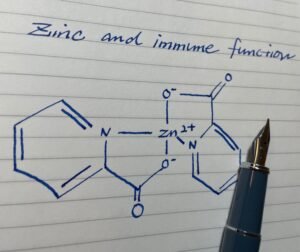How Do I Find Out?
We all know that zinc is such essential nutrient in our body. With the current struggles with the COVID-19 pandemic, it is more important than ever.
Zinc is a mineral that is essential for immune function, growth, protein/fat/cholesterol synthesis, digestion, vision, taste perception, and reproductive health. Therefore, the deficiency will cause immune dysfunction, skin problems, vision disturbance, joint pain/dysfunction, digestive issues (hypochlorhydria, low stomach acid), infertility, and more.
Zinc is rich in seafood, meat, dairy, legumes, nuts, and seeds.
RDA (Recommended Daily Allowance) is 15 mg/day
ODI (Optimal Daily Intake) is 30 – 50 mg/day
But the average daily intake in the US is 10 mg/day
So how does one find out if they have enough zinc?
Here are a few ways to do so;
- Blood test – “Alkaline Phosphatase“(ALP) is a part of the CMP (Comprehensive Metabolic Panel) serum blood test. The low ALP level indicates a low level of zinc. The optimal range of ALP is 70 – 100 IU/L. The standard range is 35-115. Anyone who has less than 35 IU/L should be taking up to 60 – 100 mg/day for a limited period to replenish. But it is recommended to be monitored to avoid overdose.
- Zinc taste test – If one experiences the bitter-metallic taste when a couple of zinc liquid is dropped under the tongue, it indicates the proper level of zinc in the system. If deficient, on would not taste anything but taste like water.
Zinc intake above 20 mg can cause stomach upset or digestive symptoms. It should be taken with food to avoid this problem. A long-term intake also tends to deplete copper. One should be taking it in a 10 to 1 through 30 to 1 zinc to copper ratio to avoid this issue.
Here are some studies regarding zinc;
Zinc and its importance for human health: An integrative review
Zinc: An Essential Micronutrient
Here are the forms of zinc that are best absorbed;
Hope you find this post helpful!
Disclaimer: These statements have not been evaluated by the Food and Drug Administration. The products mentioned on this page are not intended to diagnose, treat, cure, or prevent any disease. The content in this blog should not be used as a substitute for the professional advice and/or recommendation of qualified healthcare practitioners or licensed physicians. The content presented in this blog is intended for information purposes only. Consult your doctor or healthcare practitioners for your current conditions.
I take liquid Zinc that is in liposomal form but orange flavored so cannot taste metallic bitter taste. Is there a way to tell without getting that expensive ALP blood test. Besides easily catching a cold, blurred vision, unexplained weight loss, unexplained hair loss, poor wound healing, decrease in taste and smell, brain fog, slower growth in children, and poor diabetes control per
https://centerforfamilymedicine.com/nutritional-information/10-signs-and-symptoms-of-zinc-deficiency/
Nancy, Thanks for the comment!
I personally don’t like the flavored liquid zinc for that reason. It confuses your taste buds so you won’t taste the bitter metallic sensation. If you already know that you need to take them, then, it probably would work. The ALP test is a part of CMP (Comprehensive Metabolic Panel – check 14 different tests that check vital functions of kidneys, liver, electrolytes, minerals, and more)). It is not supposed to be an expensive test at all. It would only cost my patients about $20 to get that done although CMP is typically run with other tests such as CBC (Complete Blood Chemistry), urinalysis, and so on. But it may be an entirely different story when going through the insurances…Zinc is an important nutrient but if you are experiencing the symptoms you listed, it may involve other issues such as hormone issues such as thyroid, adrenals, or other nutritional factors, to name a few.